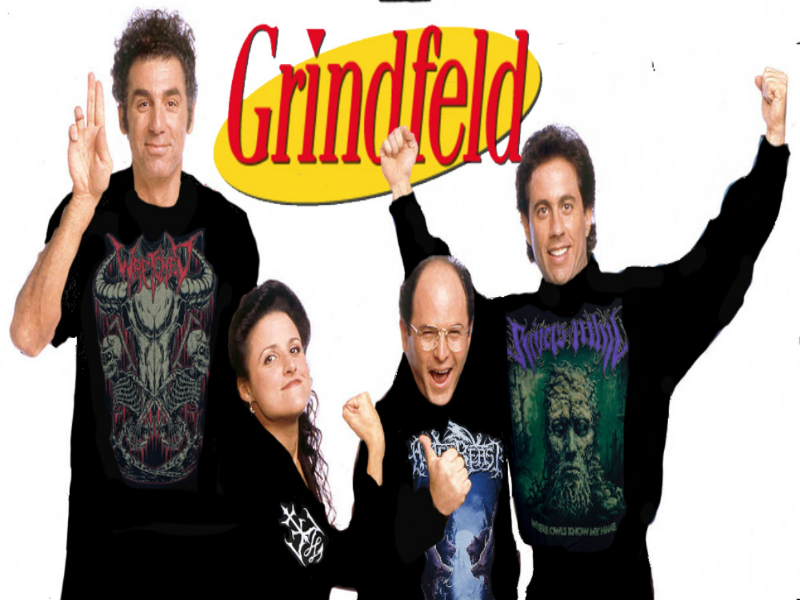Seinfeld, produced for NBC from 1990 to 1998 and in syndication ever since, has all but defined modern Jewish comedy. But it’s been a trickier business for those who’ve tried to salute the show in their own ways. Here’s a fast romp through that history:
Masters of their own domain
The modern age of Seinfeld satire started in December 2012 with @SeinfeldToday, where writer Jack Moore and comedian Josh Gondelman used 140 characters to imagine “Modern Seinfeld” scenarios on Twitter. “Elaine joins JDate so she pretends to be Jewish. She meets an amazing guy who dumps her for being ‘too Jewy.’ George discovers falafel,” was one from the first day. “Jerry gets paranoid about his girlfriend’s past when her iPhone automatically connects to the Wi-Fi at Newman’s apartment,” proved most popular.
But after 511 of these tweets, the duo found other distractions and Gondelman, who performs Nov. 29 to Dec. 1 at Toronto’s Comedy Bar, became a writer for John Oliver’s Last Week Tonight. Nonetheless, they failed to impress the Seinfeld creators, who didn’t find much imagination in how the sitcom characters were appropriated. “We actually perturbed Larry David,” gloated Gondelman to the Philly Voice. “For him to react that way about what we created is like being dunked on by Michael Jordan.”
What if Seinfeld was still on TV?
Somebody else was even more annoyed with @SeinfeldToday, and decided to do something about it: @Seinfeld2000, created by Toronto television producer Jason Richards, turned the concept inside out through his own Bizarro World version of the characters, applied to present-day scenarios. “Seinfeld Current Day” continues on Twitter and Instagram, mutating an encyclopedic knowledge of the show with current popular culture. But when Richards self-published a story involving the Seinfeld characters visiting an Apple Store, it was removed from sale due to a copyright complaint from Warner Brothers.
No soup for this book publisher
The litigiousness of the franchise was significantly revealed in 1994, at the peak of its prime-time success, when the Carol Publishing Group published SAT: The Seinfeld Aptitude Test. A lengthy court battle ensued and, in 1998, a U.S. appeal court upheld the judgment that Seinfeld trivia wasn’t classified as fair use, but rather expression protected by copyright. Two decades later, Warner Brothers acquired the trademark for the word “Festivus” and the slogan “Festivus for the rest of us,” although there weren’t any reports last Dec. 23 of people being sued for celebrating Seinfeld’s imagined aluminum-pole holiday.
READ: FIVE THINGS ABOUT STAN LEE YOU MAY NOT KNOW
These pretzels made people thirsty
An appetite for Seinfeld experiences was verified in February 2016, when a Facebook invitation appeared for a Seinfeld pop-up bar in Toronto, inspired by the show’s Monk’s Café. It garnered a click of interest to attend from about 35,000 people, and was covered in news stories as a sure thing for that summer. It was never really going to happen, but it didn’t really matter: the cease-and-desist had already been received.
So, it seems like the only real way to sell a Seinfeld homage is to get the approval of its creators. Wale, a rapper from Washington, D.C., saluted the show in 2008 with his free download Mixtape About Nothing. Seinfeld said he didn’t understand the music, but his wife was a fan, so he contributed his own words to the 2015 sequel, The Album About Nothing: “He’s essentially like my conscience,” explained Wale.
Not that there’s anything wrong with that
The latest Seinfeld tribute didn’t ask for permission, but you wouldn’t expect that from death metal musicians, who formed the supergroup Grindfeld. They’ve received mainstream press for their new 5 Songs About Nothing, The tracks are named for episodes like “The Contest” and “The Soup Nazi,” even if it’s difficult to hear what they’re growling about. But the mission statement of Grindfeld is easier to understand: “Making light of the mundane drudgery of average daily life is simply a thin veil laid over the nihilistic truths put forth by Larry David and Jerry Seinfeld during the quintessential time in our collective generation’s upbringing.”
